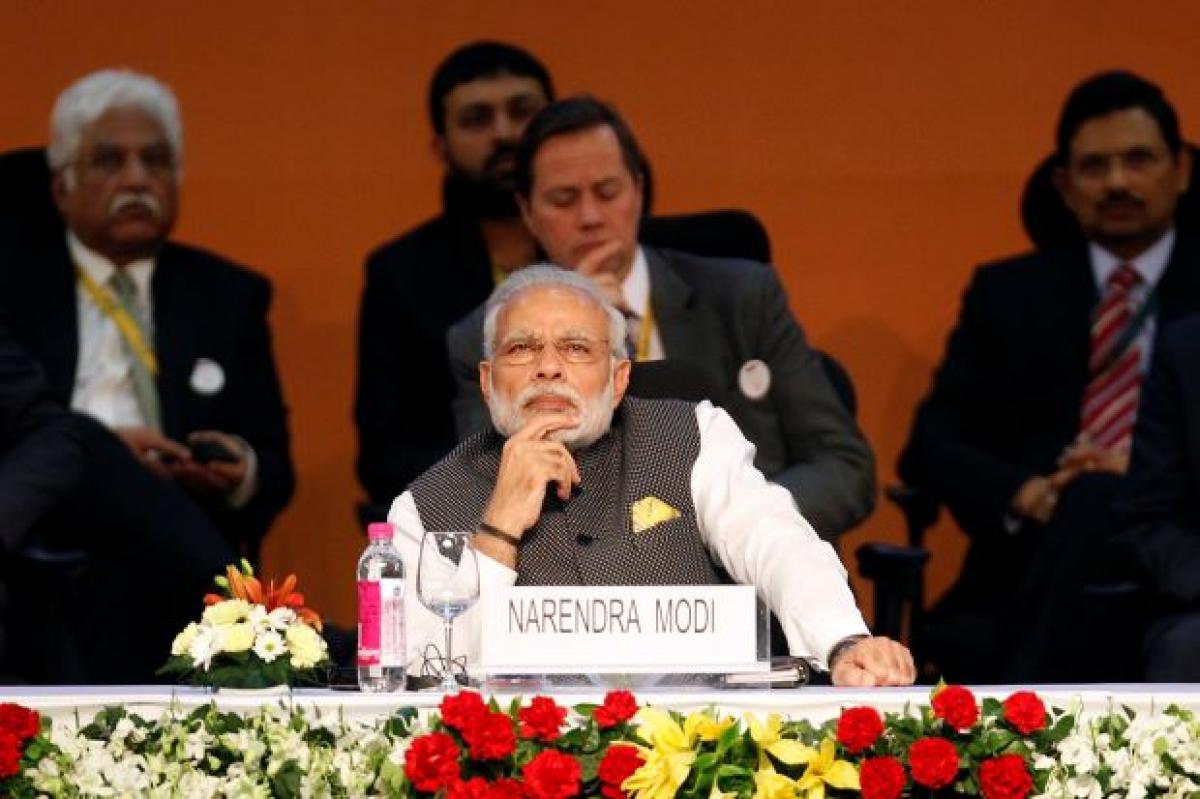Live
- Former Speaker Tammineni’s clout on the wane
- Attack on media: Take action against Mohan Babu, demand journalists
- More sports equipment promised at Central Park
- Mohan Babu’s attack on journalists inhumane act
- West Quay-6 of VPA to get revamped
- Rajaiah demands govt to introduce SC categorisation Bill in Assembly
- Make all arrangements for smooth conduct of Group-2 exams
- CP congratulates chess champs
- Stage set for children’s science exhibition
- ‘Generation Green’ initiative to drive e-waste awareness
Just In

Prime Minister Narendra Modi has moved to clean up political funding with limits on cash donations and new \"election bonds\", but some politicians and election officials said the measures would have limited impact.
Prime Minister Narendra Modi has moved to clean up political funding with limits on cash donations and new "election bonds", but some politicians and election officials said the measures would have limited impact.
With several state polls about to begin that will help determine his chances of re-election in 2019, Modi's administration sought to tackle widespread perceptions of vote buying by capping cash donations to political parties at 2,000 rupees ($30).
Previously the ceiling was 20,000 rupees.
Announcing his 2017/18 budget, Finance Minister Arun Jaitley also unveiled a scheme under which donors could buy "election bonds" from a designated local bank and give them to political parties to deposit into their account.
Forcing donations through the banking system would mean the assets were declared and so could be traced.
The government also threatened action against political parties that did not file tax returns. They do not pay income tax, but filing returns could bring transparency to the system.
"This reform will bring about greater transparency and accountability in political funding, while preventing (a) future generation of black money," Jaitley said.
The changes will not directly impact elections getting under way, but the government is likely to see them as a way to burnish Modi's credentials as a graft-fighter after he announced a series of measures to tackle illicit wealth.
In another move that may catch the voter's eye in the big battleground state of Uttar Pradesh this month, Jaitley bolstered rural and infrastructure spending.
The government also cut the basic personal tax and taxes on small firms that make up most of India's businesses, offering relief to those strapped for cash after higher value banknotes were scrapped in a radical move against undeclared wealth.
ILLICIT CASH
With no federal election funding, unaccounted cash has long been the lifeblood for political parties.
In some cases, they collect money from candidates and businessmen and spend it to stage rallies, hire helicopters and lavish voters with liquor, mobile phone credit, saris, or simply cash.
"Elections are a business in India. The more you invest, the better your chance of winning. Money power and muscle power matter," said H.S. Brahma, former head of India's election commission that oversees elections in the world's biggest democracy.
"This (budget announcement) won't do everything, but it is an important step."
Indian election spending has ballooned in the last few decades as parties compete with ever more showy campaigns, and businessmen ratchet up donations to politicians in the hope of winning future building approvals or licences.
Modi's ruling Bharatiya Janata Party (BJP) has been among the biggest spenders. In the 2014 national election, Modi trounced the opposition with a campaign that included 3D holograms of him giving speeches in villages across India.
Campaign spending in Uttar Pradesh, India's most populous state with 200 million people, is forecast to hit a record 40 billion rupees ($600 million).
"Whether the limit is 20,000 or 2,000 rupees, it is not going to help. State funding of elections is the only way to bring transparency " said Damodar Rout, vice president of a regional party that rules the eastern state of Odisha.
N. Bhaskara Rao, chairman of Delhi-based Centre for Media Studies which tracks election financing, said loopholes remained.
"Parties will find a way to get around these new rules. There are so many ways they can keep donations off the books," he said.
These include "remote" payments involving a donor providing a service instead of cash, for example paying for rallies or providing transport.
Parties could also simply record a higher number of contributions below the 2,000 rupee threshold.WHO IS HIT HARDEST?
While the changes will affect all parties, Rao said regional ones would feel them more than the BJP or main opposition Congress party because a greater proportion of their income is from undisclosed sources.
A study released by the Association for Democratic Reforms (ADR) said 65 percent of the BJP's total income had come from unknown sources over an 11-year period beginning in 2004/5.
Congress did not disclose the source of 83 percent of its funds, while the regional group that controls Uttar Pradesh had shown 94 percent of its income came from unknown sources.
Anil Verma, a retired major general who heads the ADR, said the impact of the measures would depend on whether parties were compelled to list the identities of those giving cash and itemize the source of donations on tax returns.
"The public needs to know who is giving the money," he said.
While the precise rules of electoral bonds are not yet clear, observers said the scheme could mean even less transparency than now.
Jaitley said in his budget speech the new proposals were designed to address donor concerns about protecting anonymity.
"Donors have also expressed reluctance in donating by cheque or other transparent methods, as it would disclose their identity and entail adverse consequences," he said.

© 2024 Hyderabad Media House Limited/The Hans India. All rights reserved. Powered by hocalwire.com







